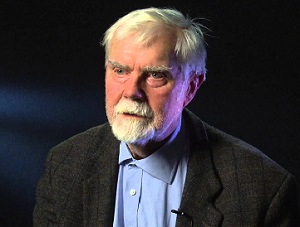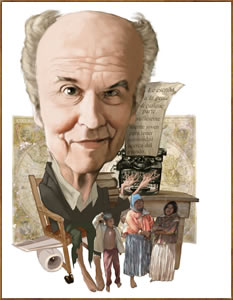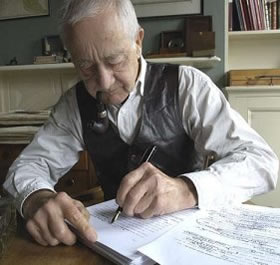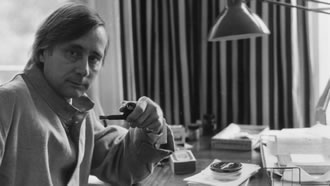De Duitse schrijver Kristof Magnusson werd geboren op 4 maart 1976 in Hamburg. Zie ook alle tags voor Kristof Magnusson op dit blog.
Uit: Summer of Love
“Günther erzählte mir, dass Bolinas ein Fischerdorf war, das Anfang der Siebziger von Hippies übernommen wurde. Er selbst sei seit zehn Jahren hier, eigentlich Fahrlehrer aus Bochum, aber nach einem Lottogewinn aus der Deutschland AG ausgestiegen. Hier habe er Frieden gefunden, kein Massentourismus bringe die Gewalt und den Konsum aus der Außenwelt hierher. Alle Wegweiser, die die Straßenmeisterei auf der Landstraße aufstellte, verschwänden noch in der selben Nacht. Hastig fügte er hinzu, dass ich natürlich okay sei, weil kein Massentourist. Man lebe gut hier, immer gebe es etwas zu feiern und zu rauchen; ganz besonders heute, auf der Geburtstagsparty für den Summer of Love. Man könne auch im Saloon sitzen, der übrigens Zimmer vermiete, und Gün Tonics trinken, oder Gün Fiddich. Er lachte und bot an, mich zu massieren. Ich stand auf und bekam seine Visitenkarte: Günther, massage for the working class, Ocean View Boulevard, Bolinas. Ich ging.
Es war ein heißer Tag. Als ich zum ersten Mal mit den Füßen auf die Dorfstraße trat, merkte ich, wie weich und klebrig der Teer war. Eine Frau mit langen grauen Zöpfen kämpfte mit einem handbetriebenen Rasenmäher. Er blieb im viel zu hohen Gras stecken, aber sie versuchte es immer wieder mit einer Beharrlichkeit, die ich in einem Hippiedorf einer Wiese gegenüber nicht erwartet hätte. Auf dem Weg zum Strand wurde es immer hektischer: Schüsseln, Lebensmittel, Bierdosen und Colaflaschen wurden zum Strand getragen, ein großer Grill wurde angefeuert. Im Sand war eine Bühne aufgebaut und eine Band begann mit dem Soundcheck. Ich ging in den Saloon und mietete mir ein Zimmer.”
Kristof Magnusson (Hamburg, 4 maart 1976)
De Afghaanse schrijver Khaled Hosseini werd geboren op 4 maart 1965 in Kabul. Zie ook alle tags voor Khaled Hosseini op dit blog.
Uit: De vliegeraar van Kabul (Vertaald door Miebeth van Horn)
‘Mijn vader was een natuurkracht, een uit de kluiten gewassen exemplaar van de Pashtun, met een volle baard, een grillige bos bruine krullen die even tegendraads was als de man zelf, handen die eruitzagen alsof ze in staat waren een wilg uit de grond te rukken, en felle zwarte ogen die ‘de duivel smekend om genade op de knieën konden dwingen’, zoals Rahim Khan altijd zei. Als hij met zijn geweldige lengte van 1.92 meter op een feest de kamer binnen stampte, trok hij alle ogen naar zich toe, als zonnebloemen die zich naar de zon wenden.
Baba was zelfs als hij sliep niet te negeren. Ik stopte altijd plukjes watten in mijn oren en trok de deken over mijn hoofd, en nog drong het geluid van Baba’s gesnurk – dat veel weg had van het ronken van een vrachtwagenmotor – door de muren heen. En mijn kamer was helemaal aan de andere kant van de hal. Hoe mijn moeder ooit kans heeft gezien in dezelfde kamer als hij te slapen is me een raadsel. Dat staat op de lange lijst dingen die ik mijn moeder had willen vragen als ik haar ooit had ontmoet.’

Khaled Hosseini (Kabul, 4 maart 1965)
De Oostenrijkse dichter en schrijver Robert Kleindienst werd geboren op 4 maart 1975 in Salzburg. Zie ook alle tags voor Robert Kleindienst op dit blog.
elaborierte nähe
bilder allabendlich:
vergessen, unvergessen,
orgasmisch zentriert –
bilder von tulkarem
verändert zu spät
wahr genommen
der ein, einschreibbare
wehlaut wiederholung
unterm strich
so zu sagen
es wäre
es sei
auch
diesmal
zu
wenig
minder: postkartengrüße
maledivische kadaver, angeschwemmt
in überragender nahaufnahmen-manier, nur jetzt,
nur jetzt: hieße es abschied nehmen
vom bild mit palmen im hintergrund,
vom geruch des balsamierenden kokosnussöls,
abstand zu nehmen von übermalungen
in der vielzahl eines toten, eines – nur jetzt
ließe sich auch das maledivische nahe
entfernter betrachten
Robert Kleindienst (Salzburg, 4 maart 1975)
De Duitse schrijfster en vertaalster Annette Seemann werd geboren op 4 maart 1959 in Frankfurt am Main. Zij studeerde tot 1982 1982 in Frankfurt a. M. en Poitiers germanistiek en romanistiek. Haar vertalersloopbaan begon met drie theaterstukken van Carlo Gozzi. In 1998 publiceerde zij de roman Das falsche Kind“. Sinds 2002 woont zij in Weimar, waar zij in 2003 voorzitster werd van de vriendenkring van de Gesellschaft Anna Amalia Bibliothek. Over de voormalige hertogin van Weimar Anna Amalia schreef zij ook een biografie.
Uit: Anna Amalia – Herzogin von Weimar
„Anna Amalias Projekt, die Weimarer Bibliothek auch für bürgerliches Publikum, Schüler und Studenten inbegriffen, zu öffnen, hatte Vorläufer, etwa in ihrer Heimatstadt Wolfenbüttel, doch für den mitteldeutschen Raum war es einzigartig. Wenngleich die Bücher der Herzogin keineswegs große Kostbarkeiten darstellten, so ergänzten sie doch die vorhandenen Weimarer Buchschätze ideal. In Anna Amalias Regierungszeit und danach wurde dieser Bestand konsequent weiter ausgebaut. Es waren im wesentlichen Prägungen, die die Herzogin in dem kultur- und bildungsfreundlichen Elternhaus in Wolfenbüttel und Braunschweig empfing, die sie zu Käufen anregten. Die Kapitel dieses Buchs über die Herzog August Bibliothek in Wolfenbüttel und die mütterliche Privatbibliothek ebenso wie über die Weimarer Herzogliche Bibliothek und Anna Amalias private Büchersammlung führen dies näher aus.“
Annette Seemann (Frankfurt am Main, 4 maart 1959)
De Duitse dichter, graficus, karikaturist en satiricus F. W. Bernstein (eig. Fritz Weigle) werd geboren op 4 maart 1938 in Göppingen. Samen met Robert Gernhardt, Eckhard Henscheid, F. K. Waechter, Chlodwig Poth, Bernd Eilert en Hans Traxler richtte hij de legendaire Neue Frankfurter Schule op, waarvan het satirische blad Titanic in 1979 de spreekbuis werd.
Apokalypsen-Programm
Montag geht die Welt zugrunde
Dienstag regnet’s und ist kalt
Mittwoch um die zehnte Stunde
wird kein Geld mehr ausgezahlt
Donnerstag nur Feuersbrünste
Freitag früh ist Jüngster Tag
Samstag Ende aller Künste
und zwar ZACK auf einen Schlag
Sonntag herrscht dann endlich Ruhe
und die Straßen wüst und leer
auf der Post noch ein Getue
Pst – nun ist auch das nicht mehr
F. W. Bernstein (Göppingen, 4 maart 1938)
De Franse dichter en essayist Léon-Paul Fargue werd geboren op 4 maart 1876 in Parijs. Zie ook alle tags voor Léon-Paul Fargue op dit blog.
Uit: Haute solitude
« Mon destin, c’est l’effort de chaque nuit vers moi-même, c’est le retour au cœur, à pas lents, le long des villes asservies à la bureaucratie du mystère. Que m’importe d’être né, d’être mort, d’avoir cent ans de cheveux, des dispositions pour la marine marchande, un mètre d’esprit de contradiction et des femmes fidèles dans les lits des autres ? Que m’importe d’avoir ma place retenue d’avance sur ce monde que je connais pour l’avoir fait ? Je suis de ceux qui sèment le destin, qui ont découvert le vestiaire avant de se risquer en pleine vie. Je suis arrivé tout nu, sans tatouages cosmiques. Le doux géant qui me tracasse quand je me sens encore désossé par le sommeil, c’est l’Univers que je me suis créé, qui me tient chaud en rêve. Et si je meurs demain, ce sera d’une attaque de désobéissance. »
Léon-Paul Fargue (4 maart 1876 – 24 november 1947)
Portret door Henri Rousseau
De Engelse schrijver Alan Sillitoe werd geboren op 4 maart 1928 in Nottingham. Zie ook alle tags voor Alan Sillitoe op dit blog.
Uit: Saturday Night and Sunday Morning
“It was Saturday night, the best and bingiest glad time of the week. Piled up passions were exploded on Saturday night and the effect of a week’s monotonous graft in the factory was swilled out of your system in a burst of goodwill.”
(,,,)
“You followed the motto of be drunk and be happy! Kept your craft arms around female waists and felt the beer going beneficially down the elastic capacity of your guts.”
Alan Sillitoe (Nottingham, 4 maart 1928)
De Italiaanse schrijver Giorgio Bassani werd geboren op 4 maart 1916 in Bologna. Zie ook mijn blog van 4 maart 2007.
Uit: The Garden of the Finzi-Continis (Vertaald door Jamie McKendrick)
„We walked up and down for perhaps twenty minutes, following the arc of the beach. The only jolly person of the company was a little girl of nine, daughter of the young couple in whose car I was riding. Thrilled by the same wind, the sea, the mad eddies of sand, Giannini gave her gay, expansive nature free rein. Though her mother tried to forbid it, she had taken off her shoes and stockings. She rushed towards the waves attacking the shore, and allowed her legs to get wet up to the knees. She seemed to be having the time of her life, in other words; and in fact, a little later, when we climbed back into the cars, I saw in her lively little cheeks, a passing shadow of frank regret.
After we had reached the Via Aurelia again, in five minutes’ time we were in sight of the turnoff for Cerveteri. Since it had been decided that we were going straight back to Rome, I was sure we would go on. But instead, at this point, our car slowed down more than was necessary, and Giannina’s father thrust his arm out of the window. He was signaling to the second car, about thirty yards behind us, his intention to turn left. He had changed his mind.“
Giorgio Bassani (4 maart 1916 – 13 april 2000)
De Duits-sorbische dichter, schrijver en vertaler Kito Lorenc werd geboren op 4 maart 1938 in Schleife (Oost-Sachsen). Zie ook mijn blog van 4 maart 2007.
Mein kurzer Wintertag
Bernsteinli
cht sprühst du
über blauende Schatten
Unterm Falbgras
birgst du das Haar
der Tiere im Feld
die großen Augen
ruhn in der Sasse
Fruchten läßt du
die Mistel am Baum
hauchst nach der Rauhnacht
heimlich mir
in die frostklamme Hand
Glanz legst du
auf die Hasel
tönst das Weidengezweig
Daß ich nicht störe
deinen Verlauf
wenn ich Sorge trag
lös mir
die Spur von der Sohle
schneeleicht
Kito Lorenc (Schleife, 4 maart 1938)
De Madagassische dichter en schrijver Jean-Joseph Rabearivelo werd geboren op 4 maart 1901 in Antananarivo. Zie ook alle tags voor Jean-Joseph Rabearivelo op dit blog.
Naissance du Jour
Avez-vous déjà vu l’aube aller en maraude
au verger de la nuit ?
La voilà qui revient
par les sentes de l’Est
envahies des glaïeuls en fleurs :
elle est tout entière maculée de lait
comme ces enfants élevés jadis par des génisses ;
ses mains qui portent une torche
sont noires et bleues comme des lèvres de fille
mâchant des mûres.
S’échappent un à un et la précèdent
les oiseaux qu’elle a pris au piège
Jean-Joseph Rabearivelo (4 maart 1901 – 22 juni 1937)
De Russische dichteres en dissidente Irina Ratushinskaya werd geboren op 4 maart 1954 in Odessa. Zie ook alle tags voor Irina Ratushinskaya op dit blog.
Uit: In the Beginning
“How strange it mustlook to an uninitiated observer: either you are loaned a typewritten manuscript for twenty-fourhours, or there could be a gathering of about twenty people in one room, all silently reading the one work, a sheet at a time; you read one page, pass it on, and wait for the next from your neighbor. The smoke filled room is in a silence broken only by the rustle of paper going hand to hand. Somewhere my work is being read just like this, and we both understand fully what that means. Soon, soon, we shall come up against that bloody-meat grinder, and the more we know about who set it in motion and why, the better our chances of standing fast and surrendering nothing: not our fledgling faith, nor our convictions, nor our future freedom. For surely our homeland will not be enslaved and paralyzed by fear for ever? Can emigration really be the only solution? At present it does seem to be the only way, or they’ll wring our necks the moment we dare utter a peep. And we want to live— oh, how we want to live! This system will last for centuries, is the gloomy prediction of our new friends… Never mind what people think: totalitarianism endures not through force of intellect, but by force of tanks.And there’s no shortage of those!”

Irina Ratushinskaya (Odessa, 4 maart 1954)
De Poolse journalist, schrijver en journalist Ryszard Kapuściński werd geboren in Pinsk, Polen (thans Wit-Rusland), op 4 maart 1932. De familie Kapuściński wist na het uitbreken van de Tweede Wereldoorlog een deportatiekonvooi van het Sovjet-Russische leger richting Siberië te ontvluchten en uit te wijken naar Lviv en vervolgens naar Warschau. Zijn vader sloot zich bij het verzet aan en de jonge Kapuściński kreeg in de hoofdstad met ontberingen zoals honger te maken. Na de oorlog studeerde hij geschiedenis en Poolse taal- en letterkunde aan de universiteit van Warschau. In 1949 maakte hij zijn debuut met gedichten in het blad Dzis i Jutro. Bij het jeugdblad Sztandar Mlodych deed hij zijn eerste schreden op het journalistieke pad; hij reisde ervoor door allerlei Aziatische landen waarbij hij onder meer India, China en omliggende landen aandeed. Kapuściński sloot zich in 1953 bij de Poolse communistische partij aan. Eind jaren vijftig maakte hij onder andere journalistieke reportages over Belgisch-Kongo. In Afrika maakte hij de dekolonisatie en de chaotische tijd daarna van nabij mee. Niet alleen zag hij 27 revoluties en staatsgrepen aan zich voorbijtrekken, ook werd hij viermaal onderworpen aan een ter dood veroordeling.Toen in 1981 Solidarność, de vrije vakbond van Walesa alsmede de journalistiek met een strenge aanpak van de Poolse communistische regering te maken kregen, besloot Kapuściński voor zijn lidmaatschap van de communistische partij te bedanken.
Uit: The Shadow of the Sun (Vertaald door Klara Glowczewska)
„More than anything, one is struck by the light. Twilight everywhere. Brightness everywhere. Everywhere, the sun. Just yesterday, an autumnal London was drenched in rain. The airplane drenched in rain. A cold wind, darkness. But here, from the morning’s earliest moments, the airport is ablaze with sunlight, all of us in sunlight.
In times past, when people wandered the world on foot, rode on horseback, or sailed in ships, the journey itself accustomed them to the change. Images of the earth passed ever so slowly before their eyes, the stage revolved in a barely perceptible way. The voyage lasted weeks, months. The traveler had time to grow used to another environment, a different landscape. The climate, too, changed gradually. Before the traveler arrived from a cool Europe to the burning Equator, he already had left behind the pleasant warmth of Las Palmas, the heat of Al-Mahara, and the hell of the Cape Verde Islands.
Today, nothing remains of these gradations. Air travel tears us violently out of snow and cold and hurls us that very same day into the blaze of the tropics. Suddenly, still rubbing our eyes, we find ourselves in a humid inferno. We immediately start to sweat. If we’ve come from Europe in the wintertime, we discard overcoats, peel off sweaters. It’s the first gesture of initiation we, the people of the North, perform upon arrival in Africa.“
Ryszard Kapuściński (4 maart 1932 – 23 januari 2007)
De Surinaamse dichter Bernardo Ashetu (Eig. Hendrik George van Ommeren) werd geboren in Kasabaholo op 4 maart 1929. Hij bracht zijn jeugd in Suriname door en een groot deel van zijn latere leven als scheepsmarconist in de Caraïbische wateren. Hij debuteerde in de reeks Antilliaanse Cahiers van De Bezige Bij met de omvangrijke bundel Yanacuna (1962), ingeleid door Cola Debrot, waarin behalve gedichten ook enkele korte poëtisch getoonzette prozastukjes staan, die mogelijk als prozagedicht zijn op te vatten.
Onkruid
Bespot mij niet
vandaag
nu ’t mis is
met m’n kleurkrijt.
De tonen zijn
te zwak van
m’n mooie klarinet.
Bespot mij niet
vandaag
nu ik met de
spade omwoel m’n
tuin vol bitter onkruid.
Bernardo Ashetu (4 maart 1929 – 3 augustus 1982)
De Franse dichter Jacques Dupin werd geboren in Privas, Ardèche, op 4 maart 1927. Hij behoort met André du Bouchet, Yves Bonnefoy en Philippe Jacottet tot een generatie Franse dichters die rond 1950 debuteerde. Vanaf 1967 zouden deze dichters samenwerken in het tijdschrift L’Éphémère, waaraan ook Paul Celan, die La nuit grandissante van Dupin vertaalde in het Duits, korte tijd meewerkte. Al in 1950 was Dupin redactiesecretaris van het tijdschrift Cahiers d’Art waar hij het métier van (kunst)uitgever leerde en zich verdiepte in het modernisme. Hij bezocht Brancusi, Picasso, Laurens en Léger, en werd een vertrouweling van Lam, Hélion, Nicolas de Staël en Francis Bacon.
In 1954 ontmoette hij Juan Miró, het begin van een hechte vriendschap, en bezocht hij voor het eerst het atelier van Giacometti. Hij was jarenlang artistiek directeur van de legendarische galerie Maeght te Parijs, en later van Galerie Lelong. Door deze professionele bezigheden en zijn persoonlijke contacten met kunstenaars kwam het dat zijn eigen poëzie geïllustreerd werd door kunstenaars als Masson, Giacometti, Miró, Tapiès, Alechinsky
Le prisonnier
Terre mal étreinte, terre aride,
Je partage avec toi l’eau glacée de la jarre,
L’air de la grille et le grabat.
Seul le chant insurgé
S’alourdit encore de tes gerbes,
Le chant qui est à soi-même sa faux.
Par une brèche dans le mur,
La rosée d’une seule branche
Nous rendra tout l’espace vivant,
Etoiles,
Si vous tirez à l’autre bout.
L’initiale
Poussière fine et sèche dans le vent,
Je t’appelle, je t’appartiens.
Poussière, trait pour trait,
Que ton visage soit le mien,
Inscrutable dans le vent.
Jacques Dupin (Privas, 4 maart 1927)
De Amerikaanse schrijver Thomas S. Stribling werd geboren op 4 maart 1881 in Clifton, Tennessee. Nadat hij gestopt was met zijn werk als docent en als advocaat begon hij avonturenverhalen te schrijven voor populaire magazines. Zijn belangrijkste werk als serieuze schrijver ontstond tussen 1921 en 1938. Hij had succes met zijn eerste roman Birthright (1921). In der jaren dertig schreef hij de trilogie bestaande uit The Forge (1931), The Store (1932), en Unfinished Cathedral (1934). Voor The Store ontving hij in 1933 de Pulitzer Prijs.
Uit: Laughing Stock
There was a girl in Clifton to whom I had been reading THE FORGE chapter by chapter. When I finished the last installme
nt, we sat thinking about the story, and she asked me what I was going to do next. I said that I didn’t know; I was very tired, I didn’t want to stay in Clifton, and there was nowhere I wanted to go. She suggested that I would feel all right pretty soon and start my next novel. I said, “Let’s get married and go on a wedding tour.” She said that she didn’t want to interfere with my work. I told her that I didn’t think she would. Then she talked on, and I discovered that that wasn’t her real point at all; her real point was that she didn’t want me to interfere with her work; she was a public-school music supervisor and was very much enraptured with orchestras and large choruses.
We talked the matter over for some time. If we were married, we were to live down in South Florida where she had her position. I didn’t know whether or not I could write seriously down in South Florida. We pondered the matter for several days, and, finally, we drove over to Corinth, Mississippi, and were married by the county court clerk.
We arrived in Corinth late in the afternoon, and as we drove up to the courthouse, neither of us knew whether the clerk would be in at that hour. We were both dubious as to whether we really wanted the clerk to be in his office.
Thomas S. Stribling (4 maart 1881 – 8 juli 1965)




































